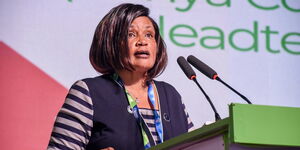Nairobi Governor Johnson Sakaja has called for a review of electricity-related levies imposed on city residents, arguing that Nairobians are unfairly subjected to a Rural Electrification charge despite living in an urban county.
Appearing before the Senate Committee on Devolution on Monday, November 24, the Governor said Nairobi residents collectively pay Ksh8 billion annually in electricity bills, a portion of which goes toward rural electrification, an area he said the capital does not benefit from.
Sakaja insisted that the levy should be redirected or restructured so that the money can be used to improve street lighting and urban security in Nairobi, which he described as a service county with unique needs.
"Nairobians pay Sh8 billion in power bills, yet these bills include a Rural Electrification charge. We have begun conversations to ensure Nairobi is considered so that part of this money can be used to light our streets for security," Sakaja told senators.
He explained that while the county government is currently running a citywide lighting programme, its pace could significantly increase if Nairobi received a fairer share of electricity-related levies.
During the same appearance, Sakaja updated senators on the city's fiscal performance, revealing that the county had reduced its inherited pending bills from Sh118 billion to Sh86 billion over three years. He noted that Sh16 billion of the bills originated from the dissolved Nairobi Metropolitan Services (NMS), which he said received Sh27 billion for development but left behind stalled projects.
"To raise more revenue, we digitised our collection platform and shifted from multiple business permits to a single business permit system, which has improved service delivery and boosted revenue," he added.
The Governor also reported that Nairobi's own-source revenue rose to Sh13.8 billion this year, the highest since devolution and a significant jump from Sh10.8 billion when he assumed office.
He highlighted the ongoing construction of markets, stadiums, and social facilities. Through the Ward Development Fund, he said, the county has completed over 140 projects, including roads across all 85 wards and multiple ECDE centres.
He added that road works valued at Sh2.1 billion are in progress, achieved through cooperation with the national government.
Sakaja went ahead to criticise the national road-funding formula, arguing that counties control 70% of the road network but receive only Sh3 billion out of Sh119 billion allocated nationally. He urged the Senate to lead reforms that would give counties a fairer share of infrastructure funding.
"If counties have 70% of the roads, then they should get about 70% of the funds," he stated.
The Governor testified before the Senate committee as part of continued oversight on Nairobi's budget utilisation and delayed development projects. He argued that securing equitable funding for both electricity and roads would speed up service delivery and enable the city to meet its infrastructure demands.












